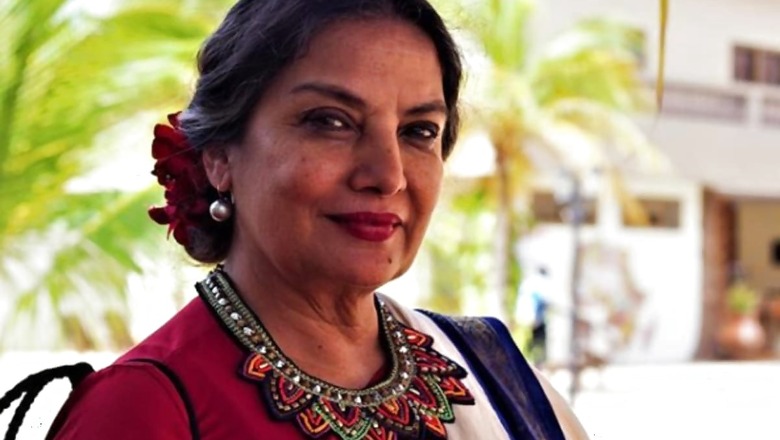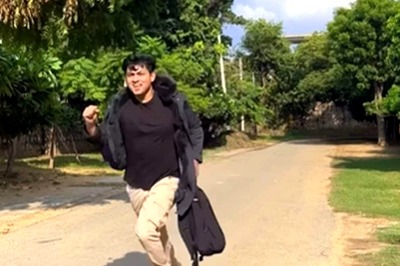
views
Acclaimed actor Shabana Azmi recently presented her brother Baba Azmi’s directorial Mee Raqsam, which is about a young motherless Muslim girl whose desire to learn Bharatnatyam creates ripples in her conservative community. It was also the opening film at the Coalition of South Asian Film Festivals (CoSAFF).
In this freewheeling chat, Shabana talks about the relevance of the film in these current times, what gives her strength to stand up for what she believes in, and Bollywood’s present state.
Mee Raqsam beautifully depicts that a community looking inward is the only way to move forward…
Absolutely! We grew up as children of parents who celebrate India’s pluralism and India’s culture. We grew up celebrating all the festivals, whether it was Holi, Diwali, or Christmas. For us (Shabana and Baba), that’s the way we lived life. We don’t know any other way. Hence, what we are saying is that there is a difference and we have to learn to make that out, between one’s religion and one’s cultural heritage. We belong to the parents who are artistes and who were surrounded by artistes, and art knows no barrier. The purpose of art is to feel. My father had written a song long ago– “Todna apna kaam nahi hai, hum hain dilo ko jodne wale; Kya Hindu aur kya Muslim, kaise gore kaise kaale; Ek hi maala ke sab daane, hum deewane hum parwane.” So my point is if you get into a slanging match, nothing will happen. You have to look inwards as to what are the changes that can be brought here and then have a sane debate. It’s very important to have a sane debate and that space seems to be shrinking.
One of the most important scenes of the film is when Maryam (Aditi Subedi) performs Bharatnatyam on a Sufi song. It was a big statement…
I was present at the shooting of the song. But when I first saw it in a theatre with people, there wasn’t a single eye that was looking anywhere else but at the screen. All were moved and it gives a sense of healing. I think Baba (Azmi) along with his writer has proved that quiet determination goes a long way because it is not about dance, it’s about living life on your own terms and Baba said it with conviction.
Danish Hussain’s character Salim stood beside Maryam and her art like a rock throughout the movie. Did that character remind you of your father in any way because the film was also an ode to Kaifi Azmi?
Obviously, the values are quite strong and you can see that in the film. It’s not a preachy film it’s a very emotional film but at a subliminal level, there are all these messages and celebrates the spirit of the common man who only wants to delve into the goodness in his life. The film is about a point of view. It’s not pitting one community against another. It is a battle between a worldview that is progressive, liberal against a worldview that is intolerant unaccepting, and hateful.
It’s hard to ignore the parallels to what we are seeing in the current political landscape while watching the constant othering of Maryam and her father, Salim, in the film…
When Baba thought of making this film as a tribute to my father’s birth centenary, he was telling a story– the story between a father and daughter. And now it has become obviously extremely timely. But within that, it’s exactly this– are you willing to have a sane dialogue? Do you want to stand with the problem or the solution? What is the step forward that you want to choose for yourself? I think it’s up to each individual to make a choice.
Mee Raqsam is important also in the sense that it promotes the idea that art is beyond any boundaries and religion. What role do you see art playing in today’s society?
It plays an extremely important role. What is it that has kept people sane even through this difficult pandemic? It is what they have as an audience received in terms of the films and series that they have been watching and music that they have been listening to and books that they have been reading. Art has softened the edges. Art has this ability to rise above barriers and to touch you at a level that is totally pure.
You have been someone who has constantly used her platform for addressing pressing issues, from the portrayal of women in the Hindi cinema to speaking up for minorities in the country. What gives you the greatest strength to continue to stand by your principles, come what may?
I think something that my father told me a long time ago and it has become my mantra. He’d said when you are working for a change, you have to build into the possibility that change might not occur within your lifetime, yet you have to have the conviction that if you carry on working sincerely then change will happen even if it does so after you are gone. When you see it in that perspective then there’s no room for frustration because you are seeing it from a larger perspective. Transformation takes time. What you can do is to offer resistance and a different point of view.
What are the changes that you see in the Hindi cinema today?
The way films are made in the Hindi cinema has changed over the years and it has changed for the better and the fact that what OTT has done is also brought into focus the fact that content is king. And that’s why different kinds of films are being made and different subjects are being tackled. There is no longer a desire to cater to only a handful of films. We have found that every kind of audience exists. It’s the question of reaching out. People keep saying that parallel cinema is dead. I don’t think it’s dead. I think it has rather taken on a different avatar.
There’s been so much happening in the film industry for the past three months. A lot of women in Bollywood have also been subjected to online abuse and death and rape threats for speaking up. How do you see this whole thing?
I feel very sorry for the trolls. Imagine, if your purpose in life is to get up in the morning and vomit out vile stuff. What a pathetic life it must be. To me, it reveals much more of the very shallow upbringing of people who use the anonymity to spew venom like this. It reveals more about them than the people towards who it is targeted.



















Comments
0 comment